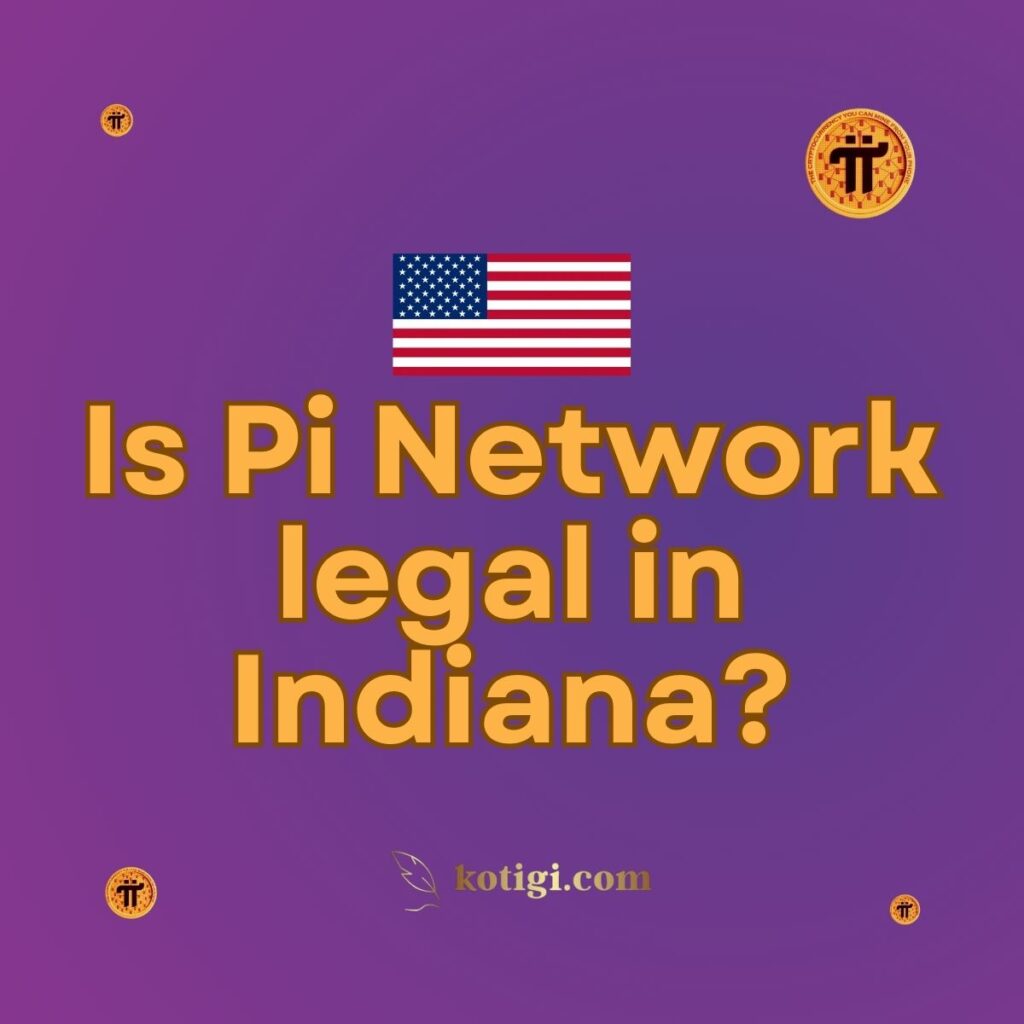
Is Pi Network legal in Indiana?
Yes, Pi Network is legal in Indiana. Residents can engage in Pi Network’s mobile mining without facing state-imposed restrictions. However, participants should adhere to federal guidelines related to taxation and consumer protections to ensure compliance as Pi Network progresses.
Introduction
As interest in mobile-based cryptocurrency mining grows, many in Indiana are exploring the legal status of Pi Network. Indiana residents have full access to Pi Network’s platform without additional state restrictions, making it possible for them to participate in the mobile mining ecosystem. However, compliance with federal and state guidelines is essential, particularly as the cryptocurrency landscape evolves. This article examines Pi Network’s legal standing in Indiana, federal regulations affecting users, and key considerations for anyone interested in this innovative platform.
Indiana’s Approach to Cryptocurrency and Pi Network
Indiana’s Cryptocurrency Regulations
Indiana follows a balanced approach to cryptocurrency, allowing blockchain and digital currency platforms like Pi Network to operate without specific state-level restrictions. The Indiana Department of Financial Institutions (DFI) does not regulate Pi Network as it lacks a tradeable asset, focusing instead on consumer financial services.
Blockchain Innovation in Indiana
Indiana is a tech-friendly state with an openness to blockchain and cryptocurrency innovation. Although the state has not introduced specific cryptocurrency regulations, it supports digital advancements, providing a favorable environment for Pi Network’s mobile mining model. This stance allows Indiana residents to participate in Pi Network without hindrance.
Federal Laws Impacting Pi Network in Indiana
SEC Oversight and Cryptocurrency Classification
The Securities and Exchange Commission (SEC) classifies digital assets based on their tradeability and investment characteristics. Pi Network tokens are not yet tradeable and thus are not classified as securities, exempting them from SEC regulation. This allows Indiana users to mine Pi tokens without federal securities registration, although this could change if Pi tokens become tradeable.
IRS Requirements on Cryptocurrency Taxation
The Internal Revenue Service (IRS) treats cryptocurrency as property, meaning income or gains related to digital assets must be reported for taxation. Since Pi tokens currently hold no market value, they are not subject to tax. However, Indiana users should maintain records of mining activities in preparation for future changes in IRS policy if Pi Network tokens gain value.
Consumer Protection and Security Measures for Indiana Residents
Indiana’s Consumer Protection Laws
Indiana’s Deceptive Consumer Sales Act protects residents from fraudulent or misleading business practices. If Pi Network evolves to introduce tradeable tokens, Indiana residents can rely on these consumer protection laws for legal recourse in cases of deceptive activity or security concerns.
Data Security Recommendations for Pi Network Users
Pi Network operates on mobile devices, so Indiana participants should follow data security best practices such as enabling two-factor authentication (2FA) and using strong passwords. By taking these precautions, Indiana users can align with the state’s consumer protection standards and safeguard their Pi Network accounts.
Economic Potential and Opportunities for Pi Network in Indiana
Growing Tech Sector and Blockchain Potential
Indiana’s tech sector is expanding, with a rising interest in blockchain and digital innovation. The mobile mining model of Pi Network could appeal to Indiana businesses looking to experiment with blockchain for digital engagement, loyalty rewards, or customer interaction. Although Pi coins are not yet tradeable, local businesses may benefit from potential partnerships with Pi Network in the future.
Community Engagement and Potential Partnerships
Pi Network’s community-focused platform aligns well with businesses interested in fostering customer loyalty and engagement. In Indiana, companies exploring blockchain may find potential in Pi Network for creating digital engagement strategies. While direct transactions are not yet possible, Pi Network’s growing community presents an opportunity for future collaborations.
Environmental Considerations for Pi Network Users in Indiana
Energy Efficiency and Environmental Awareness
Indiana is increasingly focused on sustainability, and Pi Network’s low-energy mobile mining approach is compatible with these environmental goals. Unlike traditional mining, which consumes large amounts of electricity, Pi Network’s mobile-friendly mining requires minimal energy, making it a suitable choice for environmentally conscious users in Indiana.
Sustainability Benefits of Mobile Mining
With its minimal energy consumption, Pi Network’s mobile mining model offers Indiana residents a way to engage in cryptocurrency mining without excessive environmental impact. This makes Pi Network an appealing option for users interested in sustainable digital practices.
Educational Resources for Digital Currency in Indiana
Blockchain Education in Indiana Universities
Indiana’s universities, such as Indiana University and Purdue University, offer programs on blockchain, cybersecurity, and digital technology. These resources equip Indiana residents with the knowledge needed to understand blockchain technology, cryptocurrency, and platforms like Pi Network.
Local Blockchain Events and Networking
Indiana hosts blockchain and fintech meetups where participants can connect, learn, and share insights on cryptocurrency trends. Events like Indiana TechConnect bring together blockchain enthusiasts, making it an excellent resource for Pi Network users to stay informed on developments in the industry and best practices for security.
Legal and Compliance Considerations for Pi Network in Indiana
Current Legal Status of Pi Network in Indiana
Pi Network is legal in Indiana, with no state-imposed restrictions limiting its use. Indiana residents can freely mine Pi tokens on mobile devices without additional compliance concerns. However, they should follow federal guidelines and monitor potential legal developments as Pi Network evolves.
Potential Regulatory Developments
As the digital currency sector matures, Indiana may adopt new regulations to enhance consumer protection. Future policies could address data security, privacy, and digital transactions if Pi tokens become tradeable. Indiana residents should stay informed of these potential changes to ensure continued compliance with evolving laws.
Conclusion
Pi Network is legal in Indiana, enabling residents to engage in its mobile mining platform without state-specific limitations. Indiana’s balanced regulatory approach and support for technology innovation make it a favorable environment for Pi Network participants. Federal guidelines on taxation and securities apply to Indiana users, though current exemptions apply as Pi tokens lack tradeable value. Indiana residents should observe federal standards, consider potential state regulations, and take security precautions to protect their participation in Pi Network.
Key Takeaways
- Legal Status: Pi Network is legal in Indiana, with no state-specific restrictions.
- Federal Compliance: Indiana users should follow SEC and IRS guidelines on digital assets.
- Consumer Protection: Indiana’s Deceptive Consumer Sales Act protects users from fraudulent practices.
- Economic Opportunities: Indiana’s tech sector may benefit from Pi Network’s future potential in digital engagement.
- Environmental Compatibility: Pi Network’s low-energy mining aligns with Indiana’s focus on sustainability.
- Educational Resources: Indiana universities and tech events provide blockchain and digital currency insights for participants.





